高一英语必修三情态动词
- 格式:doc
- 大小:41.00 KB
- 文档页数:7
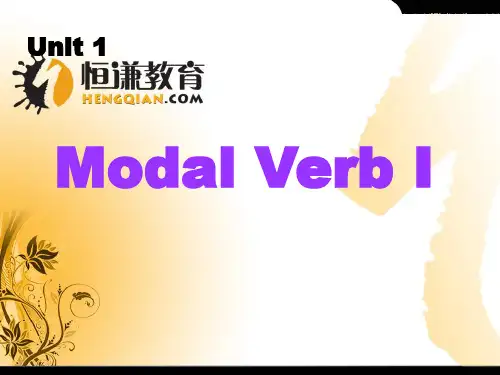
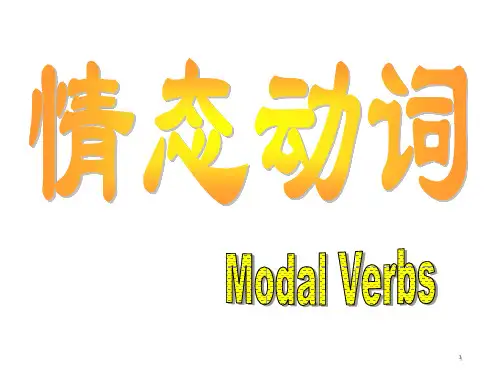
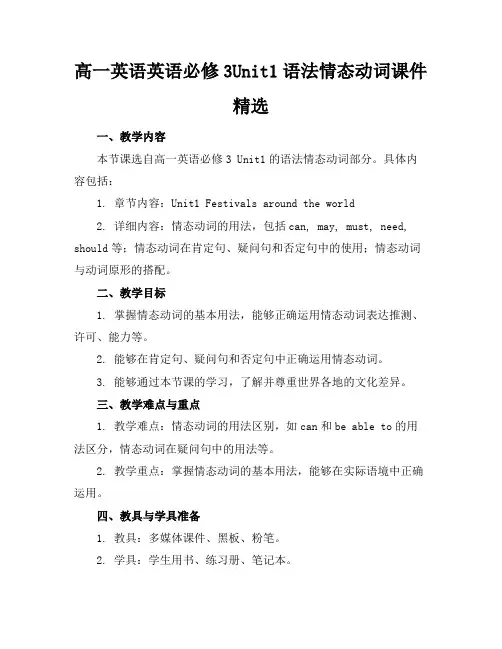
高一英语英语必修3Unit1语法情态动词课件精选一、教学内容本节课选自高一英语必修3 Unit1的语法情态动词部分。
具体内容包括:1. 章节内容:Unit1 Festivals around the world2. 详细内容:情态动词的用法,包括can, may, must, need, should等;情态动词在肯定句、疑问句和否定句中的使用;情态动词与动词原形的搭配。
二、教学目标1. 掌握情态动词的基本用法,能够正确运用情态动词表达推测、许可、能力等。
2. 能够在肯定句、疑问句和否定句中正确运用情态动词。
3. 能够通过本节课的学习,了解并尊重世界各地的文化差异。
三、教学难点与重点1. 教学难点:情态动词的用法区别,如can和be able to的用法区分,情态动词在疑问句中的用法等。
2. 教学重点:掌握情态动词的基本用法,能够在实际语境中正确运用。
四、教具与学具准备1. 教具:多媒体课件、黑板、粉笔。
2. 学具:学生用书、练习册、笔记本。
五、教学过程1. 导入:通过展示世界各地节日的图片,引导学生谈论自己了解的节日,引入新课。
2. 讲解:结合教材,详细讲解情态动词的用法,通过例句、对比等方式帮助学生理解。
3. 实践:设计实践情景,让学生运用情态动词进行对话练习。
4. 例题讲解:分析并讲解教材中的例题,帮助学生巩固所学知识。
5. 随堂练习:布置教材中的练习题,及时检查学生的学习效果。
六、板书设计1. 情态动词的基本用法can/may/must/need/should + 动词原形2. 情态动词在肯定句、疑问句和否定句中的使用3. 情态动词的用法区别七、作业设计1. 作业题目:a. 根据所学情态动词,完成下列句子。
b. 运用情态动词,编写一段关于节日的对话。
2. 答案:a. 例如:He can speak English fluently. / Can I go to the party?b. 例如:A: Can you tell me about the Spring Festival?B: Sure. The Spring Festival is the most important festival in China. We usually celebrate it with our families. We must clean our houses and make delicious food.八、课后反思及拓展延伸1. 反思:关注学生在课堂上的表现,及时了解他们对情态动词用法的掌握程度,调整教学方法。
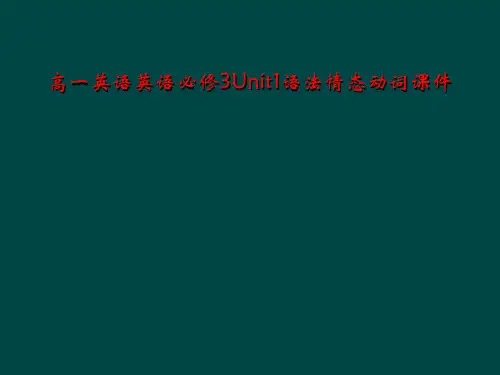
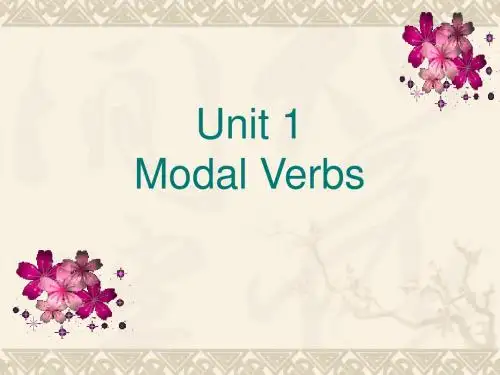
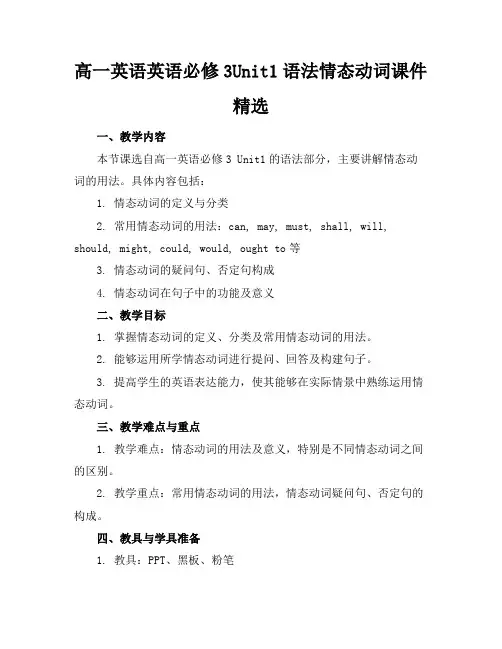
高一英语英语必修3Unit1语法情态动词课件精选一、教学内容本节课选自高一英语必修3 Unit1的语法部分,主要讲解情态动词的用法。
具体内容包括:1. 情态动词的定义与分类2. 常用情态动词的用法:can, may, must, shall, will, should, might, could, would, ought to等3. 情态动词的疑问句、否定句构成4. 情态动词在句子中的功能及意义二、教学目标1. 掌握情态动词的定义、分类及常用情态动词的用法。
2. 能够运用所学情态动词进行提问、回答及构建句子。
3. 提高学生的英语表达能力,使其能够在实际情景中熟练运用情态动词。
三、教学难点与重点1. 教学难点:情态动词的用法及意义,特别是不同情态动词之间的区别。
2. 教学重点:常用情态动词的用法,情态动词疑问句、否定句的构成。
四、教具与学具准备1. 教具:PPT、黑板、粉笔2. 学具:课本、练习本、文具五、教学过程1. 导入:通过展示一组含有情态动词的图片,引导学生观察并尝试用英语描述图片内容,自然引出情态动词的话题。
2. 新课内容呈现:a. 讲解情态动词的定义、分类及用法。
b. 通过例句展示常用情态动词的用法,让学生跟读并模仿。
c. 讲解情态动词疑问句、否定句的构成,并进行示例。
3. 实践活动:分组讨论,每组选一个情态动词,用该情态动词编写一个对话,展示给全班同学。
4. 例题讲解:针对情态动词的用法,选取几个典型例题进行讲解。
5. 随堂练习:布置一些关于情态动词的练习题,让学生当堂完成,并及时给予反馈。
六、板书设计1. 情态动词的定义、分类2. 常用情态动词的用法3. 情态动词疑问句、否定句构成4. 例题及答案七、作业设计1. 作业题目:a. 根据所给情景,用适当的情态动词完成句子。
b. 将下列句子改为情态动词疑问句。
c. 用所学的情态动词编写一个对话。
2. 答案:见课后附答案。
八、课后反思及拓展延伸1. 反思:本节课学生对于情态动词的掌握程度,以及教学过程中的不足之处。
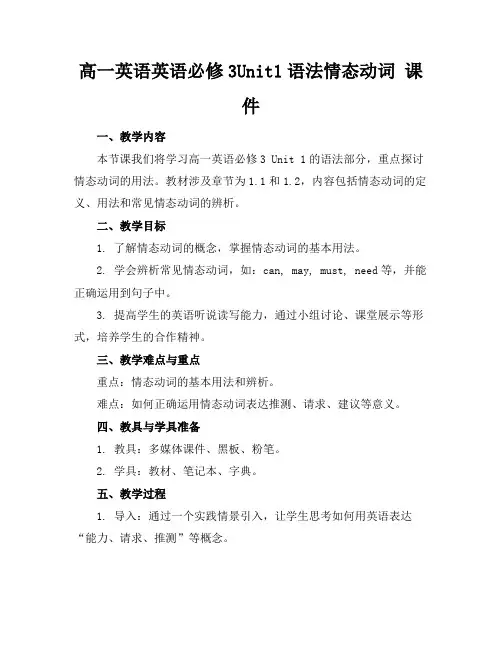
高一英语英语必修3Unit1语法情态动词课件一、教学内容本节课我们将学习高一英语必修3 Unit 1的语法部分,重点探讨情态动词的用法。
教材涉及章节为1.1和1.2,内容包括情态动词的定义、用法和常见情态动词的辨析。
二、教学目标1. 了解情态动词的概念,掌握情态动词的基本用法。
2. 学会辨析常见情态动词,如:can, may, must, need等,并能正确运用到句子中。
3. 提高学生的英语听说读写能力,通过小组讨论、课堂展示等形式,培养学生的合作精神。
三、教学难点与重点重点:情态动词的基本用法和辨析。
难点:如何正确运用情态动词表达推测、请求、建议等意义。
四、教具与学具准备1. 教具:多媒体课件、黑板、粉笔。
2. 学具:教材、笔记本、字典。
五、教学过程1. 导入:通过一个实践情景引入,让学生思考如何用英语表达“能力、请求、推测”等概念。
2. 新课内容:讲解情态动词的定义、用法,通过例句展示不同情态动词的用法。
3. 例题讲解:分析教材中的例题,讲解解题思路,引导学生正确使用情态动词。
4. 随堂练习:布置教材中的练习题,让学生当堂完成,并及时给予反馈。
5. 小组讨论:让学生分成小组,讨论如何在不同情境下使用情态动词,并进行课堂展示。
7. 作业布置:布置课后作业,要求学生运用所学知识完成。
六、板书设计1. 情态动词的定义和用法2. 常见情态动词的辨析3. 课堂练习和答案七、作业设计1. 作业题目:(1)完成教材1.2中的练习题。
(2)用情态动词编写一段对话,描述一个实践情景。
2. 答案:八、课后反思及拓展延伸1. 反思:本节课的教学效果,学生的掌握程度,以及教学过程中的不足。
2. 拓展延伸:鼓励学生在课后阅读英语文章,观察情态动词在不同语境下的使用,提高英语实际运用能力。
同时,布置一道拓展题目,让学生尝试用所学情态动词描述一个更复杂的实践情景。
重点和难点解析一、教学难点与重点1. 重点:情态动词的基本用法和辨析。
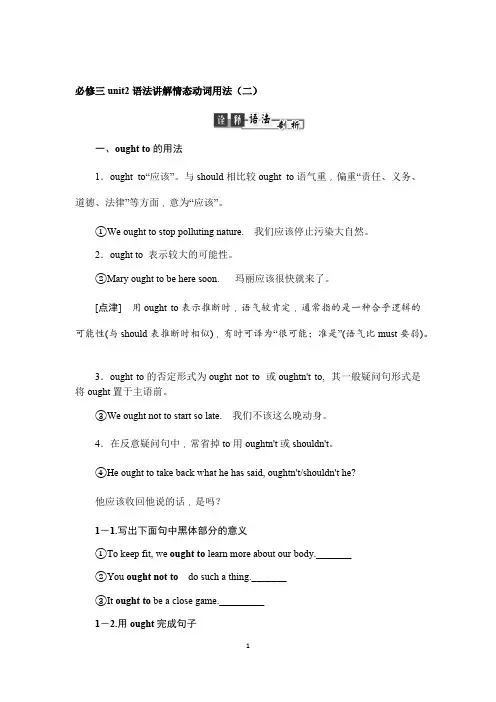
必修三unit2语法讲解情态动词用法(二)一、ought to的用法1.ought to“应该”。
与should相比较ought to语气重,偏重“责任、义务、道德、法律”等方面,意为“应该”。
①We ought to stop polluting nature. 我们应该停止污染大自然。
2.ought to 表示较大的可能性。
②Mary ought to be here soon. 玛丽应该很快就来了。
[点津] 用ought to表示推断时,语气较肯定,通常指的是一种合乎逻辑的可能性(与should表推断时相似),有时可译为“很可能;准是”(语气比must要弱)。
3.ought to的否定形式为ought not to 或oughtn't to, 其一般疑问句形式是将ought置于主语前。
③We ought not to start so late. 我们不该这么晚动身。
4.在反意疑问句中,常省掉to用oughtn't或shouldn't。
④He ought to take back what he has said, oughtn't/shouldn't he?他应该收回他说的话,是吗?1-1.写出下面句中黑体部分的意义①To keep fit, we ought to learn more about our body._______②You ought not to do such a thing._______③It ought to be a close game._________1-2.用ought完成句子④你不该责备他。
You ____________(scold )him.⑤我明天该动身吗?—______________(_leave )tomorrow?是的,你应该。
—Yes, you_ought_to.⑥我们现在应该走,是吗?We ought to go now, ____________?二、have to, don't have to与mustn't的用法1.have to(口语中常用have got to)表示客观需要做的事情,意为“必须;不得不”。
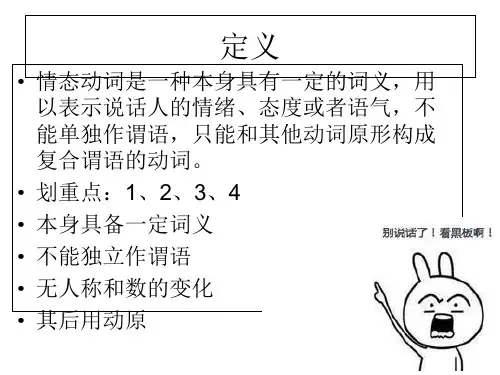
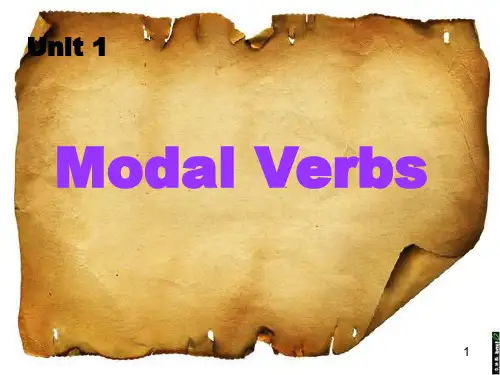
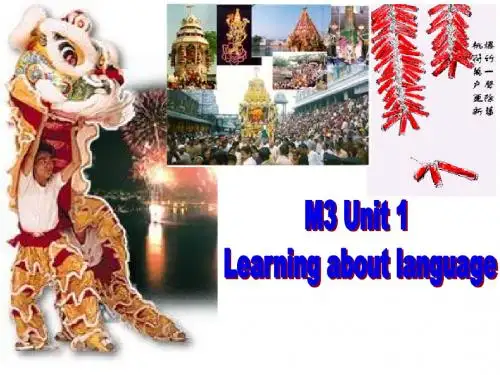
高一英语英语必修3Unit1语法情态动词课件精选一、教学内容本节课选自高一英语必修3 Unit1的语法部分,主要聚焦情态动词的用法。
具体内容包括:1. 教材章节:Unit1 "Festivals around the world"2. 语法内容:情态动词(can, may, must, might, could, should, will, would)的用法及其在不同语境中的意义。
二、教学目标1. 学生能够理解和运用常见的情态动词,表达推测、请求、能力、许可等意义。
2. 学生能在日常交流中,恰当使用情态动词,表达自己的观点和情感。
3. 学生通过学习情态动词,提高对英语语法的理解,为后续学习打下基础。
三、教学难点与重点1. 教学难点:情态动词的词义辨析及在不同语境中的运用。
2. 教学重点:情态动词的基本用法及与其他动词的搭配。
四、教具与学具准备1. 教具:PPT课件、黑板、粉笔、多媒体设备。
2. 学具:英语课本、笔记本、练习本。
五、教学过程1. 实践情景引入(5分钟)利用PPT展示世界各地的节日图片,引导学生讨论不同节日的习俗,引出本节课的主题。
2. 例题讲解(15分钟)通过PPT展示例句,讲解情态动词的基本用法,如推测、能力、请求等,并让学生模仿造句。
3. 随堂练习(10分钟)发放练习纸,让学生根据所学内容完成练习,巩固情态动词的用法。
4. 小组讨论(10分钟)5. 学生展示(5分钟)每组选出一名代表展示讨论成果,其他同学给予评价。
六、板书设计1. 情态动词的基本用法推测:can, may, must, might, could能力:can, be able to请求:can, may, could, would许可:can, may, might2. 例句展示七、作业设计1. 作业题目:根据所学情态动词,完成下列句子。
2. 答案:例句1:If I had a million dollars, I could buy a luxurious house.例句2:We should take public transportation to reduce air pollution.八、课后反思及拓展延伸1. 课后反思:针对本节课的教学效果,教师应反思教学方法是否合适,学生是否掌握了情态动词的用法。
高一英语必修三情态动词情态动词全解析一、何谓“情态动词”?情态动词主要用来表示说话人的情感、态度等,是中学英语语法的重点,也是高考的热点,是单项填空必考的一个知识点。
情态动词在近五年高考中主要考查四点:情态动词表示推测和可能性的用法;情态动词与虚拟语气;情态动词的表达“情感、态度、语气等”,情态动词表示“必要性”等方面的用法。
二、情态动词的特点1.没有人称和数的变化。
2. 有些情态动词有过去式的变化:. will → would , can → could , may→ might , dare → dared三、情态动词的否定形式情态动词+ not +动词原形can not: can't , must not: mustn't , need not : needn't四、情态动词的用法及相互间的区别(注意:这是常考的考点)1. can , be able to be able to 表示经过努力后, 能够做到; be able to 有多种形式的变化。
can1). 表示体力或脑力方面的能力;2). 表示允许、可能性。
could 是can的过去式, 表示过去有能力及过去存在的可能性 ; 用于疑问句表示委婉地提出问题。
1) The fire spread through the hotel very quickly but everyone ____ get out.A. had toB. wouldC. couldD. was able to2) -Will you stay for lunch?-Sorry, __. My brother is coming to see me.A. I mustn'tB. I can'tC. I needn'tD. I won't表示询问或说明一件事可不可做; 表示某事有可能发生。
might是may的过去式; 用在疑问中比may委婉、客气。
情态动词情态动词表示说话人对某一动作或状态的态度,认为“可能”“应该”“必要”等。
情态动词本身词义不完全,不能单独用作谓语,必须和不带to的不定式(即动词原形)连用。
情态动词没有人称和数的变化。
情态动词的否定式一般是在它们的后面加否定词not构成。
朗读时,情态动词的肯定式一般不重读。
一、can和could的用法(一)can的用法1.表“能力”。
Eg. Our company can keep pace with changes in the market.Specially-trained dogs can smell out drugs.2.表“许可”。
Eg. –- Can I use your mobile phone?--- I’m afraid not. I am expecting a call.3.表“可能性”。
多用于否定与疑问句中,但也可用于肯定句中表示理论上的可能性。
Eg. Can there be life on Mars?You can’t be tired ----you’ve only been working for an hour.You can’t have slept through that thrilling performance.4.表其他。
如“请求”“命令”“惊讶”“迷惑”“不相信”等态度。
Eg. Can you help me to lift it, please?If you won’t keep quiet, you can get out!She has left her husband, but can you blame her after the way he treated her?You can’t be serious!(二)could的用法:1.表“过去能够做某事”这样一种事实,但不指具体的某次行为。
Eg. I could read when I was three years old.He was so drunk that he couldn’t find the front door.2.表“过去的可能与许可”。
情态动词全解析一、何谓“情态动词〞?情态动词主要用来表示说话人的情感、态度等,是中学英语语法的重点,也是高考的热点,是单项填空必考的一个知识点。
情态动词在近五年高考中主要考查四点:情态动词表示推测和可能性的用法;情态动词与虚拟语气;情态动词的表达“情感、态度、语气等〞,情态动词表示“必要性〞等方面的用法。
二、情态动词的特点没有人称和数的变化。
2.有些情态动词有过去式的变化:.wil l→would,can→could,may→might,dare→dared 三、情态动词的否认形式情态动词+not+动词原形cannot:can't,mustnot:mustn't,neednot:needn't四、情态动词的用法及相互间的区别〔注意:这是常考的考点〕1.can,beabletobeablet o表示经过努力后,能够做到;beableto有多种形式的变化。
can1 ).表示体力或脑力方面的能力;2 ).表示允许、可能性。
could是can的过去式,表示过去有能力及过去存在的可能性;用于疑问句表示委婉地提出问题。
1)Thefirespreadthroughthehotelveryquicklybuteveryone____geto ut.A.hadtoB.wouldC.couldD.wasableto2)-Willyoustayforlunch?-Sorry,__.Mybrotheriscomingtoseeme.A.Imustn'tB.Ican'tC.Ineedn'tD.Iwon't表示询问或说明一件事可不可做;表示某事有可能发生。
might是may的过去式;用在疑问中比may委婉、客气。
-MayItakethisbookoutofthereading-room?-No,youmustn't.(Yes,youmay.)-MightImakeasuggestion?-Yes,youmay.3.must表示必须要做的事:必须2) 表示很有把握的推断: 一定, 准是。
语气:语气是动词的一中形式,它表示说话人对某一行为或事情的看法和态度。
语气的种类:(1)陈述语气表示动作或状态是现实的,确定的或符合事实的,用于陈述句,疑问句和某些感叹句。
如 We are ready. What a fine day it is! (2)祈使语气 表示说话人的建议,请求,邀请,命令等。
如 Open the door, Please. 应注意以下几点:主语通常是第二人称you ,但多不出现,动词用原形,否定用do not 或者don’t 加动词原形(或be ) 如 Be careful next time. Don’t smoke here. 有时为了强调,主语也可以出现,而且可以是第三人称,谓语动词不加-s 或者-es 如 You be quiet. He stand up. 祈使语气可以用do 加强语气 如 Do come to see this Sunday.在Let’s 的祈使句后,疑问部分通常用shall we ;在Let us 后,疑问部分用will you 如 Let’s go out for a walk after supper ,shall we? /Let us clean our classroom, will you? 祈使句与连词and 连用时相当于一个条件句,而and 之后则是表示结果。
如 Think hard and you will have a good idea.(3)虚拟语气 表示动作或状态不是客观存在的事实,而是说话人的主观愿望,假设或推测等。
如 If I were you, I should study English. 一.虚拟语气在条件从句的用法条件句有两类,一类是真实条件句;一类是非真实条件句,也就是虚拟条件句。
如果假设的情况是有可能发生的,就是真实条件句,谓语要用陈述语气。
如 If it doesn’t r ain tomorrow, we will go to the park.如果假设的情况是过去或现在都不存在的,或将来不大可能发生的,则是虚拟条件句。
情态动词全解析一、何谓“情态动词”情态动词主要用来表示说话人的情感、态度等,是中学英语语法的重点,也是高考的热点,是单项填空必考的一个知识点。
情态动词在近五年高考中主要考查四点:情态动词表示推测和可能性的用法;情态动词与虚拟语气;情态动词的表达“情感、态度、语气等”,情态动词表示“必要性”等方面的用法。
二、情态动词的特点1.没有人称和数的变化。
2. 有些情态动词有过去式的变化:. will → would , can → could , may→ might , dare → dared三、情态动词的否定形式情态动词+ not +动词原形can not: can't , must not: mustn't , need not : needn't四、情态动词的用法及相互间的区别(注意:这是常考的考点)1. can , be able to be able to 表示经过努力后, 能够做到; be able to 有多种形式的变化。
can1). 表示体力或脑力方面的能力;2). 表示允许、可能性。
could 是can的过去式, 表示过去有能力及过去存在的可能性; 用于疑问句表示委婉地提出问题。
1) The fire spread through the hotel very quickly but everyone ____ get out.A. had toB. wouldC. couldD. was able to2) -Will you stay for lunch-Sorry, __. My brother is coming to see me.A. I mustn'tB. I can'tC. I needn'tD. I won't表示询问或说明一件事可不可做; 表示某事有可能发生。
might是may的过去式; 用在疑问中比may委婉、客气。
1) -May I take this book out of the reading-room-No, you mustn't. ( Yes, you may.)2) -Might I make a suggestion -Yes, you may.3. must1). 表示必须要做的事: 必须2) 表示很有把握的推断: 一定, 准是。
have (has)to : have (has)got to 必须, 不得不。
过去式: had to3) -Must I get to the station before three o'clock-Yes, you must. ( No, you needn't. )4) I'm afraid you will have to wait a while.5) She must be in the classroom now.6) Mary ____ be in Paris, I saw her in town only a few minutes ago.A. mustn'tB. shouldn'tC. can'tD. may not4. shall1) 在疑问句中, 用于第一、三人称表示说话人征求对方的意见或向对方请求。
2) 用于二、三人称,表示说话人给对方的命令、警告、允诺等概念。
1) - Shall I place an order with you now -No, you needn’t.-Shall he turn down the radio a bit -Yes, please.(No, please don't.)2) You shall have the English book as soon as I finish it.3) Everything that he owns shall be taken away from him.4) Your brother seldom comes to see you, ____A. does heB. doesn't heC. will heD. isn't he5) It's a fine day. Let's go fishing, ____A. won't weB. will weC. don't weD. shall we5. should 应该; 应当1) You should listen to the doctor's advice.2) You should study the article carefully.6. will, would1) 在疑问句中用于第二人称,表示说话人向对方提出请求或询问。
用would语气更加婉转。
2) will 表示现在的习惯性动作或状态; would 表示过去的习惯性动作或状态。
3) will 用于各种人称, 表示意志、意愿、决心、允诺; would 表示过去时间的意志、意愿、......。
(1) Don't smoke in the meeting room, ___ youA. do youB. will youC. can youD. could you-Will you come with me -Yes, I will.(I am sorry , I can't.)(2) -Would you tell us something about yourself -Yes, I will.(3) - It's my birthday tomorrow. Don't forget to come to my party.- _____ .A. I don'tB. I won'tC. I can'tD. I haven't7. ought to 应该; 应当1) You oughtn't to smoke too much.2) She ____ for what she has done.A. ought to praiseB. ought be praisedC. ought to have praisedD. ought to be praised8. dare 1. dare to come 2. dare come1) He dare not tell the truth.2) He doesn't dare to come out at night.3) I don't know whether he ____ try.A. dareB. needsC. wantsD. is allowed9. need1). 作为情态动词:必须2). 作为实义动词: 需要A.主语是人need( to do something ; to be done by somebody)B. 主语是事物need ( doing; to be done)1) -Do they need to take any books with them-No, they don't need to.2) -Need we buy any new equipment -No, we needn't.3) This farm tool needs repairing.This farm tool needs to be repaired.4) -Shall I tell John about it- No, you ___ . I've told him already.A. needn'tB. wouldn'tC. mustn'tD. shouldn't5) It's a fine day. You ____ take a raincoat with you.A. can'tB. mustn'tC. needn'tD. may not[★★★]五、情态动词的解题例析(1) 认真审题,结合所给出的语境,正确把握说话者的语气、情感、态度、观点等。
(2) 认真思考所给选项中情态动词的基本特征和用法,并结合语境推敲答案。
(3) 要注意把握时间概念。
情态动词无论是表达“推测和可能性”,还是表达“虚拟”这一概念,只要是对过去已经发生的事情进行描述,一律用“情态动词+have done”这一结构;对现在或将来的事情进行描述,用“情态动词+动词或系动词原形”。
例如:(NMET2008山东,24)Thank you for all your hard work last week. I don’t think we ______ it without you.A. can manageB. could have managedC. could manageD. can have managed根据题干中所给出的时间last week可知我们已经做完了工作,已经完成,故排除A、C两项,再结合could have done表示虚拟语气以及与前面的I don’t think…,故说话者想表达的意思是:离开了你,我们本不可能完成这项工作。
故答案为B项。
★下面我们来看看常考的一些情态动词★以下试题均来源于往年的高考试题,具有很强的针对性(1) must表示推测,意为“一定……”,只能用于肯定句中。
must have done意为:一定做过某事或某事肯定发生了。
例如:—She looks very happy. She ______ have passed the exam.—I guess so. It’s not difficult after all.A. shouldB. couldC. mustD. might【解析】句意为:她看上去很高兴,一定是通过了考试。
【答案】C(2) should (not) / ought (not) to在中表示根据常规或常识推测,表示“某事应该或不应该发生”,语气比must或can’t / couldn’t稍弱。
例如:—How’s your tour around the North Lake Is it beautiful—It ________ be, but it is now heavily polluted.A. willB. wouldC. shouldD. must【解析】should此处表示推测,意为“应该”。